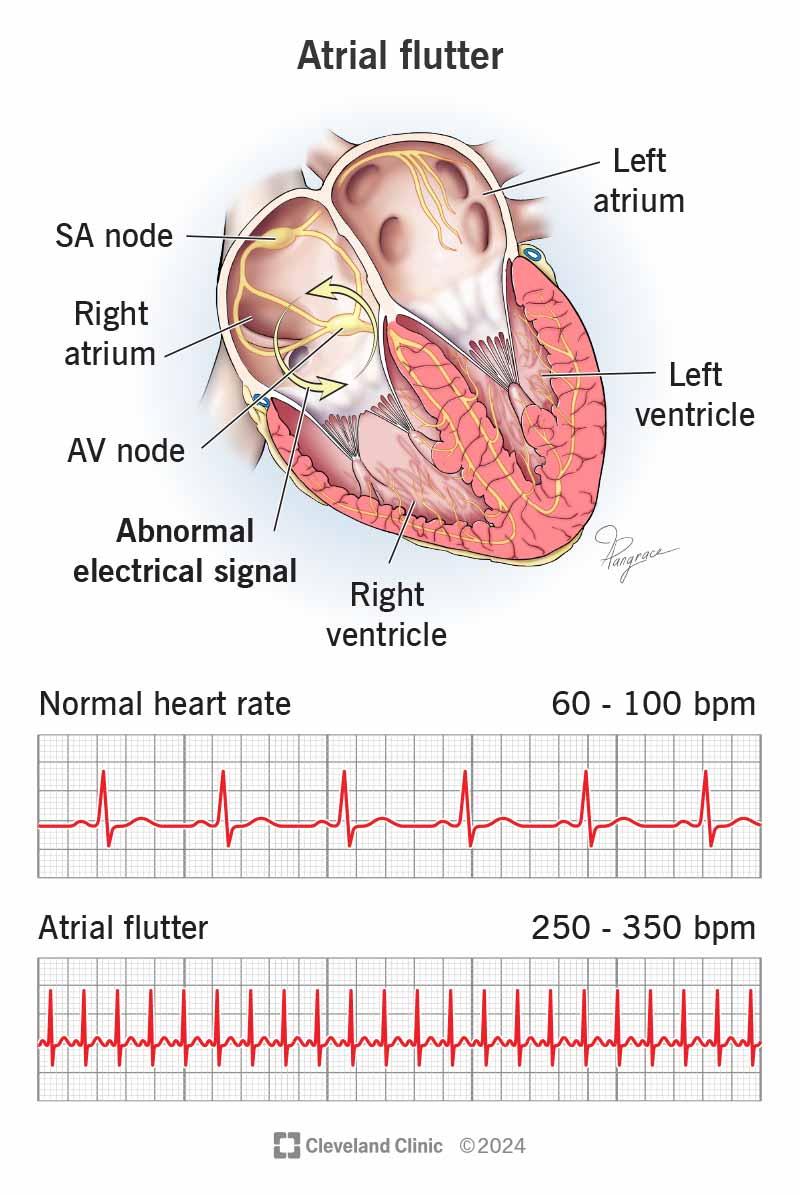Atrial flutter is a type of abnormal heart rhythm (arrhythmia) that’s too fast. This condition can lead to other problems, like a stroke or heart attack. Medications and procedures can help you get your heart rhythm back to normal. Follow-ups are important because atrial flutter can keep coming back.
Advertisement
Cleveland Clinic is a non-profit academic medical center. Advertising on our site helps support our mission. We do not endorse non-Cleveland Clinic products or services. Policy

Image content: This image is available to view online.
View image online (https://my.clevelandclinic.org/-/scassets/images/org/health/articles/22885-atrial-flutter)
Atrial flutter is a common type of supraventricular arrhythmia. This means it’s an abnormal heart rhythm that starts in the upper chambers of your heart. With atrial flutter, your heart beats in a fast but consistent pattern. Faulty electrical signals cause this to happen.
Advertisement
Cleveland Clinic is a non-profit academic medical center. Advertising on our site helps support our mission. We do not endorse non-Cleveland Clinic products or services. Policy
A normal heart rate is 60 to 100 beats a minute when you’re at rest. Atrial flutter can make your heart’s upper chambers beat 250 to 350 times a minute. This causes your lower chambers to beat fast in response, commonly as fast as 150 beats a minute or more.
A provider can tell which type of atrial flutter you have based on your electrocardiogram (EKG) results.
Some people don’t have atrial flutter symptoms. For others, symptoms include:
Electrical signals that are too frequent cause atrial flutter, making the upper chambers of your heart contract (pump) too often.
Atrial flutter causes include:
Advertisement
Your risk of atrial flutter increases as you age. Men are also at a higher risk.
Medical conditions that can raise your risk include:
When you have atrial flutter, your heart isn’t working as efficiently as it should. Blood flow through your heart is like an assembly line. Blood moves from one chamber to the next before leaving your heart.
But atrial flutter is like having the speed set too fast at an assembly line’s first station. Your heart’s chambers can’t fill with blood fast enough because the contractions are too frequent. Also, there isn’t enough time for your atria (upper chambers) to empty all their blood into your ventricles in the lower part of your heart. This causes your heart to pump less blood to your body than it should.
A provider may use tests to diagnose atrial flutter, including:
Atrial flutter treatment may begin with treating the condition that caused it. Treatment for atrial flutter itself includes medications and procedures.
Medicines work well for many people with atrial flutter. Any medicine can have side effects, but the benefits usually are greater than the risks. When medicines don’t work, your provider may recommend a procedure that can help.
Medicines for the treatment of atrial flutter include drugs that:
Procedures to treat atrial flutter include:
Advertisement
Rarely, you can have complications from an ablation, including:
Cardioversion works in 70% to 90% of people. Some people have less than a 5% chance of atrial flutter happening again after a catheter ablation. Others may have less successful procedures because of their type of atrial flutter. People with complex cases of atypical atrial flutter may have only a 70% success rate with ablation.
After having an ablation, you can expect to have some limits for the first week. This means waiting a week before you drive a vehicle or lift more than 10 pounds.
Because there’s no cure for atrial flutter and it carries a high risk of stroke, you’ll need follow-up appointments all your life. It’s important to keep your appointments because it’s common for atrial flutter to keep coming back. People with atrial flutter may have multiple hospital visits because of this.
Although you can’t prevent some of the risk factors for atrial flutter, limiting your alcohol intake can help. Also, you can get medical care for the problems that cause atrial flutter or put you at risk for it
Advertisement
Make sure you keep your follow-up appointments with your healthcare provider. Each year, they’ll figure out your stroke risk based on other medical conditions you may have. You may need to take an anticoagulant if your provider believes you’re at risk of a stroke.
You’ll have regular visits with your provider to catch any complications that may happen. Also, your provider may repeat tests they used to diagnose you. Contact your provider if you experience a reaction to a medication or if your symptoms change or worsen.
You should seek medical care when you have a fast heartbeat (150 beats per minute or more) while at rest.
Questions to consider asking your provider may include:
Atrial flutter isn’t life-threatening, but it is serious. If you don’t treat atrial flutter, you may have life-threatening complications. For example, you may have a stroke or heart attack.
A heart rhythm that’s too fast can make you feel uneasy. But your healthcare provider can help you with treatments for atrial flutter. These treatments may lower your risk of a stroke or heart failure. That’s why it’s important to keep your appointments with your provider. They can figure out your risk of stroke and offer solutions to get your heart rhythm back to normal. Your provider can help you decide which treatment is best for your situation.
Advertisement
Learn more about the Health Library and our editorial process.
Cleveland Clinic's health articles are based on evidence-backed information and review by medical professionals to ensure accuracy, reliability, and up-to-date clinical standards.
Cleveland Clinic's health articles are based on evidence-backed information and review by medical professionals to ensure accuracy, reliability, and up-to-date clinical standards.
When your heart rhythm is out of sync, the experts at Cleveland Clinic can find out why. We offer personalized care for all types of arrhythmias.
